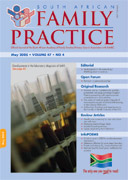CPD Ethics: Ethical Issues in Family Practice: My Culture – Right or Wrong?
Abstract
Health professionals educated in and practicing Western medicine in multicultural settings often face moral dilemmas resulting from exchanges with patients whose cultural background holds different beliefs and standards than does their own. For example, one of the best known is that of female genital mutilation (FGM). The main argument held by societies in which FGM is traditionally practised is that the prohibition of the practice would lead to the dissolution of the society’s cohesion. The moral objection, however, is that FGM is intrinsically wrong. As emphasised by Rachels Rachels, J. 2001. The Challenges of Cultural Relativism. In: Moral Relativism: A Reader. P K Moser & T L Carson,(Eds.)New York: Oxford University Press: 63., if a practice is harmful – as it is with FGM – there is an objective moral reason to condemn it. But there are some cultural practices and beliefs which are not as clear when it comes to moral judgment. As health professionals, we should be culturally sensitive. We ought to respect other cultures’ values and show appropriate tolerance for various reasonable cultural codes and beliefs. This, however, does not mean that all beliefs and practices are equally admirable or that we ought to withdraw moral judgements that strike us as being clearly justifiable or right. These attitudes reflect nothing but moral relativism. (SA Fam Pract 2005;47(4): 47-48)
Published
2005-05-01
Issue
Section
Review Articles
By submitting manuscripts to SAFP, authors of original articles are assigning copyright to the South African Academy of Family Physicians. Copyright of review articles are assigned to the Publisher, Medpharm Publications (Pty) Ltd, unless otherwise specified. Authors may use their own work after publication without written permission, provided they acknowledge the original source. Individuals and academic institutions may freely copy and distribute articles published in SAFP for educational and research purposes without obtaining permission.

